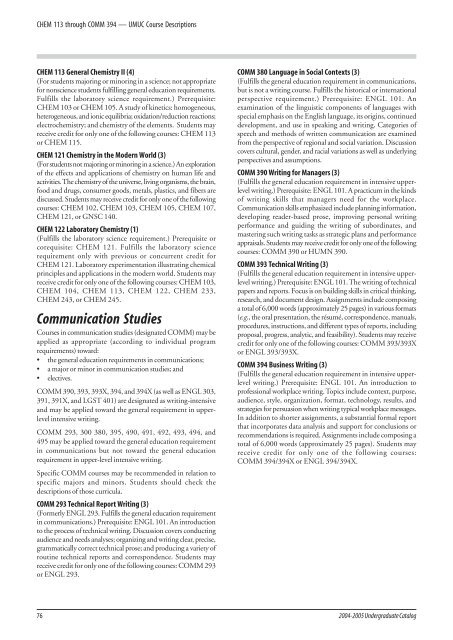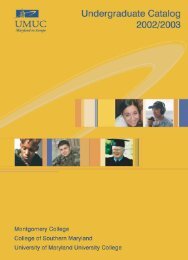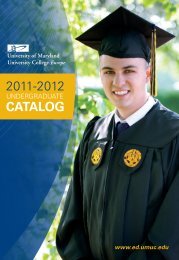Statements of Policy - UMUC Europe
Statements of Policy - UMUC Europe
Statements of Policy - UMUC Europe
You also want an ePaper? Increase the reach of your titles
YUMPU automatically turns print PDFs into web optimized ePapers that Google loves.
CHEM 113 through COMM 394 — <strong>UMUC</strong> Course Descriptions<br />
CHEM 113 General Chemistry II (4)<br />
(For students majoring or minoring in a science; not appropriate<br />
for nonscience students fulfilling general education requirements.<br />
Fulfills the laboratory science requirement.) Prerequisite:<br />
CHEM 103 or CHEM 105. A study <strong>of</strong> kinetics: homogeneous,<br />
heterogeneous, and ionic equilibria; oxidation/reduction reactions;<br />
electrochemistry; and chemistry <strong>of</strong> the elements. Students may<br />
receive credit for only one <strong>of</strong> the following courses: CHEM 113<br />
or CHEM 115.<br />
CHEM 121 Chemistry in the Modern World (3)<br />
(For students not majoring or minoring in a science.) An exploration<br />
<strong>of</strong> the effects and applications <strong>of</strong> chemistry on human life and<br />
activities. The chemistry <strong>of</strong> the universe, living organisms, the brain,<br />
food and drugs, consumer goods, metals, plastics, and fibers are<br />
discussed. Students may receive credit for only one <strong>of</strong> the following<br />
courses: CHEM 102, CHEM 103, CHEM 105, CHEM 107,<br />
CHEM 121, or GNSC 140.<br />
CHEM 122 Laboratory Chemistry (1)<br />
(Fulfills the laboratory science requirement.) Prerequisite or<br />
corequisite: CHEM 121. Fulfills the laboratory science<br />
requirement only with previous or concurrent credit for<br />
CHEM 121. Laboratory experimentation illustrating chemical<br />
principles and applications in the modern world. Students may<br />
receive credit for only one <strong>of</strong> the following courses: CHEM 103,<br />
CHEM 104, CHEM 113, CHEM 122, CHEM 233,<br />
CHEM 243, or CHEM 245.<br />
Communication Studies<br />
Courses in communication studies (designated COMM) may be<br />
applied as appropriate (according to individual program<br />
requirements) toward:<br />
• the general education requirements in communications;<br />
• a major or minor in communication studies; and<br />
• electives.<br />
COMM 390, 393, 393X, 394, and 394X (as well as ENGL 303,<br />
391, 391X, and LGST 401) are designated as writing-intensive<br />
and may be applied toward the general requirement in upperlevel<br />
intensive writing.<br />
COMM 293, 300 380, 395, 490, 491, 492, 493, 494, and<br />
495 may be applied toward the general education requirement<br />
in communications but not toward the general education<br />
requirement in upper-level intensive writing.<br />
Specific COMM courses may be recommended in relation to<br />
specific majors and minors. Students should check the<br />
descriptions <strong>of</strong> those curricula.<br />
COMM 293 Technical Report Writing (3)<br />
(Formerly ENGL 293. Fulfills the general education requirement<br />
in communications.) Prerequisite: ENGL 101. An introduction<br />
to the process <strong>of</strong> technical writing. Discussion covers conducting<br />
audience and needs analyses; organizing and writing clear, precise,<br />
grammatically correct technical prose; and producing a variety <strong>of</strong><br />
routine technical reports and correspondence. Students may<br />
receive credit for only one <strong>of</strong> the following courses: COMM 293<br />
or ENGL 293.<br />
76<br />
COMM 380 Language in Social Contexts (3)<br />
(Fulfills the general education requirement in communications,<br />
but is not a writing course. Fulfills the historical or international<br />
perspective requirement.) Prerequisite: ENGL 101. An<br />
examination <strong>of</strong> the linguistic components <strong>of</strong> languages with<br />
special emphasis on the English language, its origins, continued<br />
development, and use in speaking and writing. Categories <strong>of</strong><br />
speech and methods <strong>of</strong> written communication are examined<br />
from the perspective <strong>of</strong> regional and social variation. Discussion<br />
covers cultural, gender, and racial variations as well as underlying<br />
perspectives and assumptions.<br />
COMM 390 Writing for Managers (3)<br />
(Fulfills the general education requirement in intensive upperlevel<br />
writing.) Prerequisite: ENGL 101. A practicum in the kinds<br />
<strong>of</strong> writing skills that managers need for the workplace.<br />
Communication skills emphasized include planning information,<br />
developing reader-based prose, improving personal writing<br />
performance and guiding the writing <strong>of</strong> subordinates, and<br />
mastering such writing tasks as strategic plans and performance<br />
appraisals. Students may receive credit for only one <strong>of</strong> the following<br />
courses: COMM 390 or HUMN 390.<br />
COMM 393 Technical Writing (3)<br />
(Fulfills the general education requirement in intensive upperlevel<br />
writing.) Prerequisite: ENGL 101. The writing <strong>of</strong> technical<br />
papers and reports. Focus is on building skills in critical thinking,<br />
research, and document design. Assignments include composing<br />
a total <strong>of</strong> 6,000 words (approximately 25 pages) in various formats<br />
(e.g., the oral presentation, the résumé, correspondence, manuals,<br />
procedures, instructions, and different types <strong>of</strong> reports, including<br />
proposal, progress, analytic, and feasibility). Students may receive<br />
credit for only one <strong>of</strong> the following courses: COMM 393/393X<br />
or ENGL 393/393X.<br />
COMM 394 Business Writing (3)<br />
(Fulfills the general education requirement in intensive upperlevel<br />
writing.) Prerequisite: ENGL 101. An introduction to<br />
pr<strong>of</strong>essional workplace writing. Topics include context, purpose,<br />
audience, style, organization, format, technology, results, and<br />
strategies for persuasion when writing typical workplace messages.<br />
In addition to shorter assignments, a substantial formal report<br />
that incorporates data analysis and support for conclusions or<br />
recommendations is required. Assignments include composing a<br />
total <strong>of</strong> 6,000 words (approximately 25 pages). Students may<br />
receive credit for only one <strong>of</strong> the following courses:<br />
COMM 394/394X or ENGL 394/394X.<br />
2004-2005 Undergraduate Catalog






